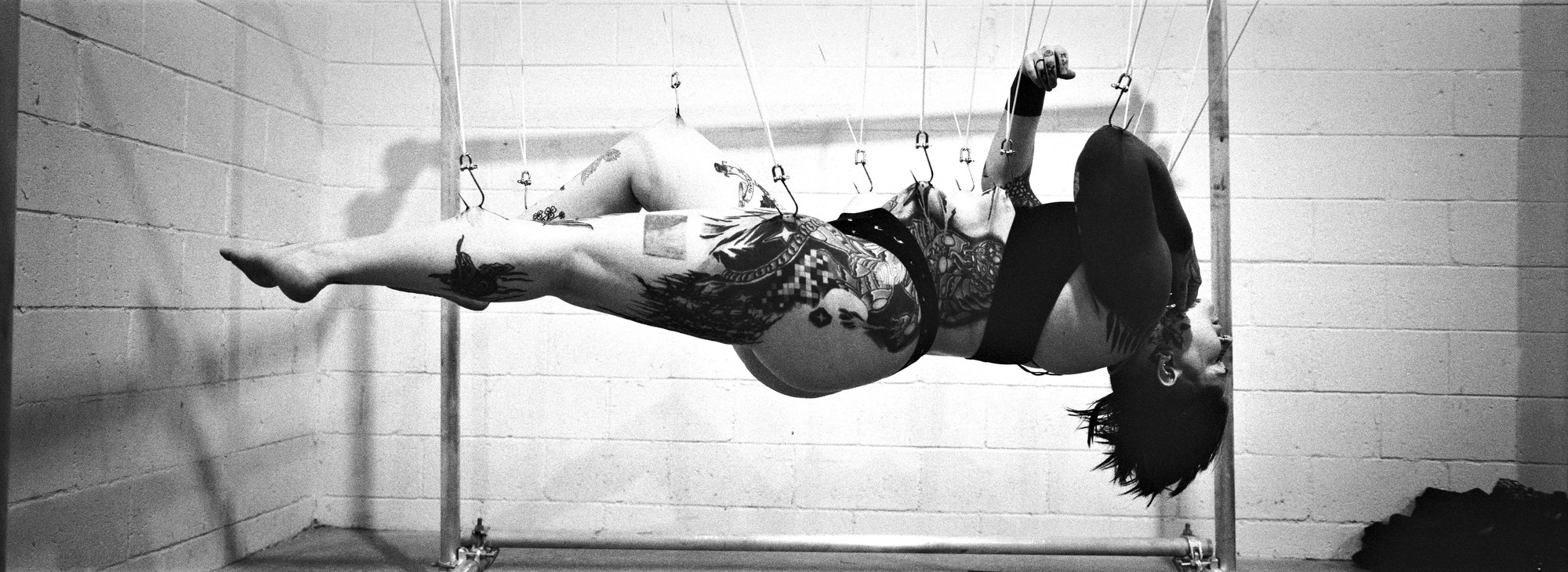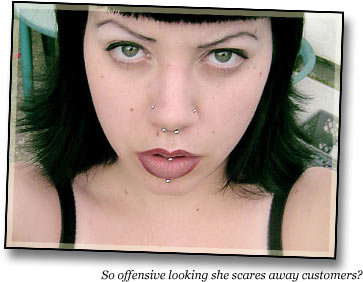
A 48 hour waiting period for tattoos? |
"Aesthetics are not our concern. If an adult understands, and it's clear that they understand, go do it! You or I may not like it, but the last time I checked this is America!!! Someone who understands what he or she is doing is free to do it."– Carl Goodman, Marblehead Board of Health
The story on the right by Alan Burke appeared in last Friday’s (October 3, 2003) edition of The Salem News in Salem, Mass. Local legislators recently passed regulation instituting a 48 hour waiting period for almost all tattoos and piercings. At first glance, it’s a fascinating concept — kind of an enforced “are you really sure you want this tattoo?” BME caught up with the chairman of the Marblehead Board of Health, Carl Goodman, and talked to him about this unusual legislation and what motivated it.
 |
BME: This is probably the first time in the country any such legislation has been instituted — what made you decide to do it? What was the motivation?

Goodman: The State had alerted boards of health that we were authorized to regulate and that the State was, again, leaving it to local boards to deal with these issues. I believe it was through the Department of Health that they made some model regulations available for local boards to work with. We looked at it and recognized this is becoming an increasingly common practice and therefore we really needed to address it from a public health perspective. If practitioners chose to operate in Marblehead we wanted to ensure that public health was protected.
BME: I don’t understand though how the 48 hours does that. You’re quoted as saying that it’ll reduce the number of drunks getting tattoos, but what’s to stop someone from being drunk again 48 hours later?
Goodman: They certainly can, but at least there’s an opportunity for someone to go “wait… what was I going to do?” It’s really because of the permanency and because it does involve what we consider to be a surgical procedure — and there is no medical professional in attendance. We had no one come forward from the industry when we published our public notice. Had there been someone saying, “hey, could we have an exception if we had a registered nurse in attendance who certified…”, but we didn’t have that. Given that this is a procedure where dyes are applied under the skin, it seemed reasonable to make sure that a customer would be giving clear consent that would be obtained in any medical context.
BME: Does the legislation also ban tattooing drunk people?
Goodman: Oh, absolutely!
BME: So, isn’t the 48 hour thing superfluous? I’m not entirely clear what it’s trying to stop.
Goodman: I don’t think it’s superfluous. It’s trying to assure that the regulations are complied with, that people have considered whether or not they want to have this permanent procedure performed.
BME: When they go to the tattoo studio to make their appointment, does the tattoo studio have any requirement to give them any paperwork — how does someone get informed about the risks?
Goodman: There’s detailed information that the practitioners will be required to give. The regulations provide that the Board of Health will develop the form for consent and notice and so on. Within the regs we’ve listed a number of issues, most of which come out of the model regs — the basic surgical risks, as well as the permanency, and so on. We’ll have all of that available, and those kinds of notices can be amended from time to time by the board so that if issues come up we’ll be able to deal with them and revise as needed.
This notice will have to be sent to the Health Department.
BME: Are you saying that all tattoos done in Marblehead have to be registered with the government?
Goodman: Notice of the tattoo, yes, but not what the specific tattoo is.
BME: The notice will include their name and identification? And it will have to be filed with the government, not just kept on record by the studio?
Goodman: Yes, that’s correct.
BME: Hmm… You’d also said that the 48 hours gives parents a chance to step in?
Goodman: Well, yes, if you’re dealing with minors then clearly we think it’s in the minor’s best interest that the parent have the opportunity to determine whether or not this invasive procedure is acceptable.
BME: Most areas restrict tattooing to 18 and over anyway. What’s the age limit in Marblehead?
Goodman: I don’t think we set a minimum age. It’s not our place to step in and tell parents that they can or can not allow their children to do something, but it is our place to make sure that minors who are undergoing a procedure obtain parental consent. If the parent permits it, that’s an individual family decision. I don’t want to get into that role!
BME: Will parents have to actually be at the studio?
Goodman: The parent must sign the consent forms. As in any other situation where parental consent is required, the proprietor of the establishment will have to determine that consent has been legitimately obtained. We don’t specify the parent has to be there, but in any situation where you need to confirm consent, you want to be sure you’ve actually got it!
BME: You’re quoted as saying there will be severe penalties for violating this 48 hour ban. What are the penalties?
Goodman: In this case it can be up to loss of license. Alternately, suspension of license or fines. If they continue working without a license, prosecution would follow which would be up to town council. The first thing that would happen is an application for a cease and desist order from the courts.
BME: Does this waiting period apply to all piercings as well?
Goodman: There’s an exception in there for single ear piercings with disposable one-time-use tools, for the jeweler that has the sleepers or the gun that does a single pierce…
BME: Does that mean if a person did an ear piercing with a needle there would be a 48 hour waiting period?
Goodman: No. Many places will do what’s called a “single pierce” where the entire instrument is disposed of. The routine, traditional ear piercing is excluded, as well as anything of this nature performed by a licensed physician. If you want to have a whole series of holes in the ear, and a physician is going to do that for you, our regulations don’t apply.
BME: I know that it doesn’t currently have a tattoo studio, but how big is Marblehead?
Goodman: Marblehead is four square miles with a population under twenty-five thousand. It’s geographically not a location where there’s a high probability that someone would want to practice this art, but as a board of health we wanted to be sure that if someone comes to town that he or she is dealing with the public in a proper way that protects the public health.
Our role — our obligation — is to protect public health, and that’s what we try to do here. But we haven’t had any bodyart applications for license yet, so I’m not sure that it will ever come up!
BME: Finally, what did you mean when you said that people having metal objects protrude from themselves wasn’t a public health issue?
Goodman: The aesthetics are not a public health issue is what I meant. Whether or not I personally like a particular kind of body art — the aesthetic issue — has nothing to do with public health. I personally may have some opinion, but that doesn’t enter into the public health issue. The public health issue is the conditions under which this is done, that it’s sanitary, that the practitioner has a certain level of competence, and that the individuals undergoing the procedure are aware and understand the surgical risks and other attendant risks associated with the procedure.
Aesthetics are not our concern. If an adult understands, and it’s clear that they understand, go do it! You or I may not like it, but the last time I checked this is America!!! Someone who understands what he or she is doing is free to do it.
This is Marblehead. We believe in independence.
So there you have it, straight from the source. Personally I wish everyone would self-impose a 48 hour waiting period (at least) on any such decision, but I’m not entirely sure that I’m comfortable being forced by the government to do so, let alone filing my name with them when I do so. At the same time, we all know that many tattoo studios, especially the less established or lower-end ones survive off of “walk-in” appointments where a person wanders in off the street and leaves with a tattoo an hour or two later. How eliminating this sector will affect the business is difficult to predict, but given the permanence of tattoos, one has to ask oneself whether it is ethical to tattoo a person that wouldn’t want that tattoo 48 hours later.
Goodman was very clear that these regulations are up for revision, and that he understand that not everyone sees the posted legal notices. Anyone, especially those in the area, are always welcome to visit or contact the Board of Health (at 781-631-0212) and discuss the issues, and they are willing to work with studios (should they ever open in Marblehead) to fine-tune these regulations to serve the public good.
We should also look at some important nuances in both Goodman’s statements, and in the regulations themselves. Other than the waiting period, one of the things that sets Marblehead’s regulations apart is the empowerment of parents. A majority of areas are restricting tattooing to 18 and over, regardless of the parent’s wishes — Marblehead leaves that power in the right place (the individual or their guardian), whereas too many governments have seized it for themselves. In addition, Goodman, who personally does not like tattoos or piercings — going so far as to avoid shopping at stores where he’s going to have to come in contact with it — still stands vehemently behind the credo of “I may not like what you’re doing, but I support your right to do it” (in 48 hours that is).
Correction: Mr. Goodman wrote us to clarify, “while you are right that I am personnaly not a fan of body art, the Evening News while generally correct, at least in
substance, on its quotes, did not correctly quote me in the last paragraph. What I said in response to Mr. Burke’s question about seeing people with multiple facial piercings was that I know some people try to avoid shopping in certain establsihments …. I actually wouldn’t modify my shopping patterns because of a clerk’s appearance, although I certainly have would because of a clerk’s attitutde!”In addition it should be noted that State law in Mass bans anyone under the age of 18 from being tattooed, so Marblehead’s lack of legislation in that area does not mean that minors are permitted, even with parental consent.
BME will continue to follow this story — if similar regulations are passed in your area, let us know!

Shannon Larratt
BMEzine.com

























